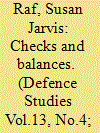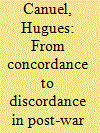|
|
|
Sort Order |
|
|
|
Items / Page
|
|
|
|
|
|
|
| Srl | Item |
| 1 |
ID:
128241


|
|
|
|
|
| Publication |
2013.
|
| Summary/Abstract |
On 30 November 2000 the UK Government enacted legislation leading to the formalisation of freedom of official government information (within specified bounds) for the UK voting public. The Freedom Information Act (FOI Act), although passed into law in 2000, did not come into full effect in the UK until January 2005. In order to 'police' the Act, the Information Commissioner's Organisation (ICO) was set up. The ICO is responsible for monitoring the performance of 43 government bodies1 against performance requirements under the FOI Act 2000. This includes a deadline for responding to initial Requests for Information (RFIs) of 20 working-days. The ICO also handles any unresolved2 complaints or disputes concerning non-disclosure or late release of information requested under an RFI.
To head the ICO, the new post of Information Commissioner was created in January 2001, subsuming the previous role of the Data Protection Registrar.3 The incumbent works within the bureaucracy of the Ministry of Justice (MOJ), reporting directly to Parliament in order to remain politically independent.4 The powers of the Information Commissioner include the use of various levels of sanction. These include formal legal action against government bodies that fail to comply with the provisions of the FOI Act 2000 and other related information legislation.5 Every quarter, and annually, the UK Statistics Authority, on behalf of the ICO and the MOJ, reports on the performance of all 43 monitored government bodies against the requirements of the FOI Act 2000.
|
|
|
|
|
|
|
|
|
|
|
|
|
|
|
|
| 2 |
ID:
128242


|
|
|
|
|
| Publication |
2013.
|
| Summary/Abstract |
In recent Nigeria, the domestic terrorism of the Islamic group popularly known as 'Boko Haram' is hard to ignore. Almost everyday, television broadcast of the latest news, newspapers, magazines, and websites running and re-running pictures of dramatic and incessant acts of violence carried out by these ferocious group. Major initiatives to combat the nuclear proliferation and domestic terrorist threats posed by the 'Boko Haram' group have been launched by the Federal Government and international security institutions. In fact, considerable amount of money and political capital have been committed to new and continuing programmes to enhance nuclear security. Although, these and other efforts are worthy of support, it is not obvious that they reflect any clear ordering of priorities, or that they are being implemented with a sense of urgency. In order to correct this situation, this paper explicates the issue of Boko Haram domestic terrorism in Nigeria, taking an in-depth look at the historical antecedents, motivations, objectives and structures that can help in preventing them. This paper concludes with the advocacy of how citizens can assist in checking the menace of Boko Haram crises in the country in order to tackle these monstrous groups whose callous activities have become a hydra in Nigeria.
|
|
|
|
|
|
|
|
|
|
|
|
|
|
|
|
| 3 |
ID:
128243


|
|
|
|
|
| Publication |
2013.
|
| Summary/Abstract |
It was a remarkable sight, on this sunny day of 26 August 1944: the patrician figure of Charles de Gaulle leading the victory parade down the Champs-Élysées following the evacuation of the French capital by the German occupier.1 The triumphal march under the acclaims of the Paris citizenry was symbolic of the dominant position the general had assumed in the Gouvernement provisoire de la République française. As provisional head of state and the dominant military figure in France, he was in a position of unprecedented power for a French army officer, at least since Napoleon Bonaparte had proclaimed himself First Consul in 1799. De Gaulle indeed held near-dictatorial powers as he set about rebuilding France at home and restoring control over her colonial empire. Nevertheless, he would resign less than two years later when faced with fierce opposition by established political figures disagreeing with his proposed constitution for a new republic.
Thus created in 1946 through the peaceful transfer of power from a quasi military supremo to a legitimately elected government, only to come to an ignominious end in 1958 under the threat of a military coup during the darkest days of the Algerian War of Independence, the short-lived French Fourth Republic experienced the full spectrum of civil-military relations (CMR). This episode provides a dramatic test case to measure the validity of any given CMR theory as it encompassed such a wide range of well-documented events focused on the very essence of the problematic, explaining civil society's relationship with the military organization established to protect it.2 One such theory seeks to measure a fundamental element of that equation, trying to answer the challenging question of '[w]hy will a military intervene in its own nation's system of government' by outlining the 'conditions [that] promote or inhibit domestic military intervention'.3 Scholar Rebecca Schiff proposed such a model nearly two decades ago, seeking to alleviate the alleged shortcomings of more established theories largely derived from the experience of the United States and often limited to arguments concerned with the separation of civil and military institutions.4
She posited instead that her theory of concordance 'considers the unique historical and cultural experiences of nations' and 'moves beyond institutional analysis by addressing issues relevant to a nation's culture'.5 This paper seeks to measure the validity of such a premise through the study of civil-military relations under the French Fourth Republic. This approach will require the reader initially to understand the evolution of CMR in France through the trauma of military defeat in 1940 and the rise of de Gaulle as well as the circumstances that led to the instauration of the Fourth Republic. It will then become necessary to evaluate the influence of successive challenges overseas, first in Indochina and then in Algeria, to establish the legitimacy of the concordance theory as civil-military relations came to a nadir in France. First, though, one must clearly comprehend the foundations of Schiff's theory in order to adequately judge its validity through the proposed case study.
|
|
|
|
|
|
|
|
|
|
|
|
|
|
|
|
| 4 |
ID:
128244


|
|
|
|
|
| Publication |
2013.
|
| Summary/Abstract |
It is crucial for states to define a justified and well-structured maritime strategy in a competitive maritime security environment. Any flaws could jeopardize the security of the people and the protection of the states' maritime interests. Furthermore due to long term investment needs of the strategy, it would lead states to waste their financial resources on the wrong assets. Governments, already under increased scrutiny by the public over their defense expenditures, pay more attention where to invest their money. Therefore, the process of forming the maritime strategy of a country requires careful analysis and a methodical approach to the problems.
Just like the competition at sea, firms in various industries face rivalry and need to determine the right strategy to cope with the challenges in their respective industries. Companies that could not keep up with the change caused by the globalization fail in their respective industries. Therefore many firms implement the strategic management process in order to stay in the game. The first phase of strategic management is the strategic planning. Before planning its strategy, a firm needs to analyze the driving forces of the particular industry. One of the most renowned methods to analyze an industry is 'Porter's Five Forces Analysis'.1 It is assessed in this study that 'Porter's Five Forces' is applicable to the analysis of maritime security environment where the players and content of the driving forces are totally different from that of the business industry analysis. Furthermore, this analysis could help military leaders fully comprehend the maritime security environment and keep track of the drastic change in it. Thus, they can model an effective maritime strategy that is justifiable both to the public and budget planners.
|
|
|
|
|
|
|
|
|
|
|
|
|
|
|
|
|
|
|
|
|